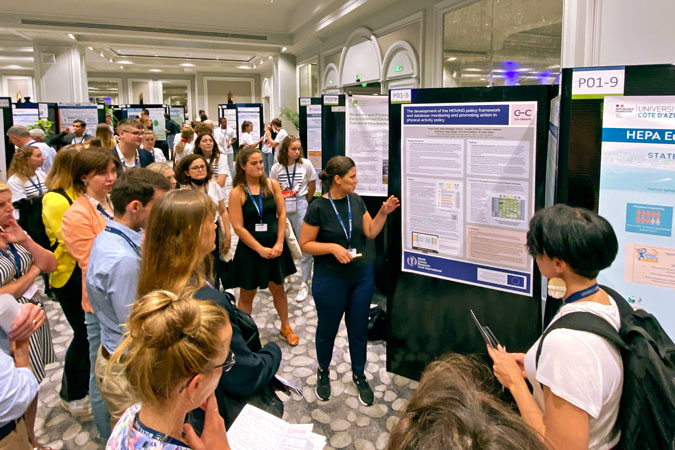1,795 policies in our databases
We’ve made huge progress adding diet and physical activity policies to the NOURISHING and MOVING databases through the CO-CREATE project. There are now 1,076 diet-related policies in NOURISHING and 719 physical activity policies in MOVING.
28 countries in the MOVING database
We’ve added physical activity policies from 27 European countries and South Africa since the MOVING database was launched in 2020.
143 countries in the NOURISHING database
We’ve significantly expanded the NOURISHING database since it launched in 2015 – it’s the older sibling to the MOVING database, with diet-related policies from 143 countries around the world.
9 statements delivered at WHO meetings
Through our official relations status with WHO, which was renewed in January for another 3 years, we have continued to participate in WHO governing body meetings such as the Executive Board and the World Health Assembly, and delivered 9 statements on issues related to cancer prevention. These include the new action plan to support the Global Alcohol Strategy, new obesity targets and recommendations, and how civil society can engage in WHO governing body processes.
1 new policy area launched
In October, as part of a session at the World Cancer Congress, we announced our intention to expand our policy portfolio to proactively engage in alcohol policy – something we’ve only done on a reactive basis in recent years. We will spend the early part of 2023 assessing where we can add the most value to alcohol policy and how we can strengthen our partnerships and capacity.
> Check out our blog from October to find out more
3 papers published
It’s been an extremely busy year in terms of writing up results and learnings from our work in the EU-funded CO-CREATE project. In April we published a paper in the Journal of Physical Activity and Health on the development of our MOVING physical activity policy framework.
In December we had two papers accepted for publication in Obesity Reviews as part of a CO-CREATE project supplement. The first focuses on our experience of populating the MOVING database and how our scan methodology was able to identify relevant policies. The second focuses on the development of our new NOURISHING and MOVING policy benchmarking tools, which evaluate the strength of policy design.
Both papers will be published shortly and available in open access.
1 new report in development
We’ve embarked on the 4th report in our Building Momentum series, which focuses on the development of physical activity policy. Our latest report will look at the promotion of physical activity in primary healthcare settings and we’ve spent a good chunk of the year interviewing policymakers and researching what makes effective policy. Keep an eye out for the new report next year.
2 WHO reports contributed to
We were delighted to be a reviewer on 2 WHO reports. In May, the WHO European Regional Obesity Report 2022 was published, which examines the growing challenge and impact of obesity in Europe, aligning with initiatives to tackle cancer.
In October, WHO published the Global Status Report on Physical Activity. This charts the slow progress on implementating the recommendations outlined in the Global Action Plan on Physical Activity, which sets a global target of a 15% relative reduction in the prevalence of physical inactivity by 2030. Less than half of countries have a national physical activity policy, of which less than 40% are operational, and only 30% of countries have national physical activity guidelines for all age groups.
7 consultations responded to
We’ve prepared consultation responses on a range of issues this year, from alcohol labelling at EU level, to new WHO guidelines to protect children from the harmful impact of food marketing, and updates to the WHO NCD ‘Best Buys’, as well as a new WHO Euro action plan on alcohol.
2 meetings of our Policy Advisory Group
We’ve convened our Policy Advisory Group twice over the last year. They’ve been instrumental in plans for our next Building Momentum report as well as advising us on the development of our policy benchmarking tools. Over the next year we will be working together to see how we can better integrate a health inequalities angle to our work.
2 letters signed
In addition to our frequent media engagement and providing comment on key policy issues, we also signed letters addressing the tactics and practices of big multi-national companies in promoting unhealthy commodities.
We co-signed a letter to Netflix calling on them to not include alcohol advertising in their new subscription model, and one to Mr Simon Stiell, Executive Secretary of the United Nations Framework Convention on Climate Change (UNFCCC), calling on the removal of Coca-Cola as a core sponsor of COP27, given the company’s portfolio of unhealthy products and polluting practices.
11 blogs published
We’ve written 11 posts this year on topics such as Breastfeeding Awareness Week, the proposed UK War on Cancer plan, and forthcoming changes to sugar sweetened beverage taxes in Barbados. Check them out.
12 1MIAM
One month in a minute is our video snapshot of what we’ve been up to each month. Each member of World Cancer Research Fund International’s Policy and Public Affairs team takes turns to share the latest progress and announcements. Come meet us all.
4 conferences attended
We’ve presented our results from the CO-CREATE project in posters and oral presentations at 4 conferences this year, including the European Congress on Obesity, the annual meeting of the International Society on Behavioural Nutrition and Physical Activity, as well as the Health Enhancing Physical Activity Conference. We also presented the NOURISHING and MOVING databases at a symposium in Brussels.

Ioana Vlad at the Health Enhancing Physical Activity Conference
5 COVID cases
Sadly, nearly all of us caught COVID at one point or other this year, despite our best efforts to protect ourselves. Everyone pitched in to help one another and happily we’ve all recovered, despite the virus’ best efforts to disrupt our plans.
3 hellos and goodbyes
We said goodbye to Margarita Kokkorou, our Senior Policy and Public Affairs Officer who started a PhD at the University of Florence, but we welcomed Jennifer O’Mara who joined in March to continue our work on the CO-CREATE project.
We said farewell to Maggie Wetzel who moved to the World Obesity Federation, but welcomed Kendra Chow as Policy and Public Affairs Manager.
Lastly, we said a temporary farewell to Kate Oldridge-Turner who has gone on maternity leave, but welcomed Rebecca Taylor who will be Head of Policy and Public Affairs over the next year.
2023: what will next year bring?
We have exciting plans for next year including the launch of our NOURISHING and MOVING indexes in March, our new Building Momentum report on physical activity promotion in primary healthcare, as well as our continued engagement with the World Health Organization, and participation in the Executive Board and World Health Assembly.
We’re looking forward to the forthcoming High-Level Meeting on Universal Coverage, as well as a range of conferences to target with our latest results from the CO-CREATE project. We may even co-author a few more papers too!
But until then, from us to you, we wish you a wonderful holiday and a happy new year!
